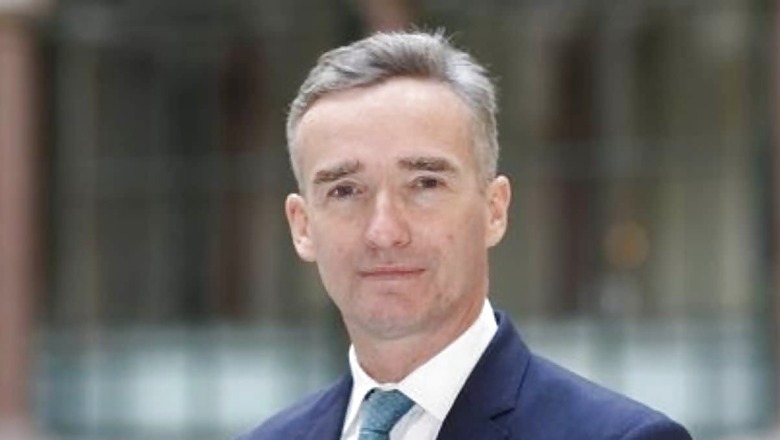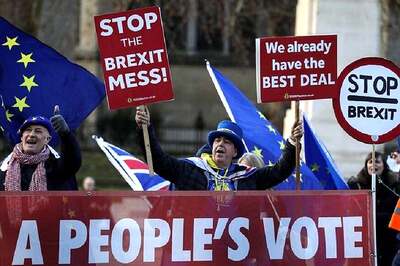
views
British High Commissioner to India Alex Ellis spoke exclusively to News18 in which he stressed why India and UK’s relations need to be much stronger now than ever amid the geopolitical competition and post-Covid pandemic world. Ellis said India’s ambition on health and energy transition will be discussed during the bilateral meetings between UK Prime Minister Rishi Sunak and Prime Minister Narendra Modi during the G20 Summit in New Delhi next month.
On the transition of UK as a “modern and diverse” country, Ellis told News18 that today the country’s PM chants ‘Jai Shri Ram’ on India’s Independence Day, which shows how the “UK is very much different now” than 76 years ago.
The issue of Khalistani extremism that has become a grave concern and sort of a pricking issue between the two countries, Ellis said it is “no more an India problem but UK’s” as it involves its citizens. Underlining that the arrests were made in the case, Ellis assured that the two countries will improve cooperation on the issue.
On the long-drawn issue of fugitives Vijay Mallya and Nirav Modi’s extradition to India, Ellis stressed that there is a process that the UK government follows. “We are improving cooperation where we can,” he said.
Edited interview
Q: How the UK and India can form a cultural alliance, specifically in terms of cuisine and sports, particularly cricket. How do you envision the development of this relationship considering the shared long, intricate, and occasionally painful history of the two nations?
The culture shared between the UK and India gives us wonderful material to work between two nations that could be in literature, Arts, especially in food… British people love Indian food, culture sports everything from Virat Kohli’s off drives. I think there is a lot we can do because there is a lot of cultural familiarity and ease between two countries. One of the things, which Indian investors tell me in the UK is the ease with which they enjoy being in the UK.
Q: UK Prime Minister Rishi Sunak said his faith is very personal when he visited Morari Bapu’s Ram Katha recently. How do you see Sunak’s assertion of his faith ahead of his first trip to India as the PM during the G20 Summit next month?
Our Prime Minister Rishi Sunak says his faith is personal so I will leave that to him but I will tell you about the modern and diverse UK – the PM, on the day of India’s Independence, goes to the ancient universities and says ‘Jai Shri Ram’. If you tell this Lord Curzon, he would have spat his breakfast out even Gandhi would not have believed it. This tells you how UK is very much different from 76 years ago.
Q: The whole of India is excited to welcome Rishi Sunak in September, and he is going to be one leader whose presence is going to catch a lot of media eyeballs. Trade deals, investments, maritime security — If you could walk us through the key agenda, which will be pressed by the UK?
I would like to highlight that there is energy transition, health as well trade. Certainly, we will come back to that but firstly it is about G20. Prime Minister Sunak is coming to support India’s priority. It is incredibly frustrating that because of Russian President Vladimir Putin’s illegal invasion of Ukraine, there are development issues. For example, the Black Sea Grain issue means less grain will reach people around the world. The UK is supporting digital public infra, the G20 meeting on this regard was held last week in Bengaluru. India’s ambition on health and energy transition will be discussed during the bilateral meetings.
Q: Can you give us time and date when the two countries will sign the trade agreement?
Free trade agreement is probably the biggest thing we are working on together right now. The timing is got to be driven by substance. We have come a long way since negotiations. The last round held in the UK made a lot of progress; good work between the two set of negotiators. This is going to be the toughest round. That’s why our trade minister is here for the G20 meet in Jaipur followed by a bilateral programme with commerce and industry minister Piyush Goyal.
Q: During the telephonic conversation in April, both Prime Minister Narendra Modi and UK’s Rishi Sunak spoke on the range of bilateral issues, including the extradition of Vijay Mallya and Nirav Modi so that they can be tried before the Indian courts. Each time around, Britain has cleared its position and has put the ball in the court of judiciary. When both PMs will sit for the bilateral meeting, this issue could be raised again by the Indian side. How will Britain respond to this?
I completely understand the frustration of the Indian side but this is a matter for court and we have an independent judiciary. These issues are absolutely sitting in court. There is is nothing more which we can do. We ordered the extradition of both individuals already but there is a legal process which we have to go through. I don’t think the UK wants to be at a place which is attracting fugitives from all over the world. That is something which the UK is looking to address. We are improving cooperation. We had the lead extradition judge of the UK here in India last year working on how we can get better cooperation over provisions of evidence and so forth. Here in India, people can understand how the UK judicial system works but it is ultimately independent.
One of the great stories in the last few years has been the flow of people from India to the UK. Nearly 1,40,000 student visas were issued in the year ending March 2023. India has overtaken China in sending most international students to the UK universities. I think, both countries have benefited from this. We are actually enhancing our cooperation on people entering the UK illegally. If we look at the overall picture, it is very positive.
Q: Due to Khalistani extremism on the British soil, India-UK ties have had an impact. How do you look at the future of Khalistani movement in the UK and can some of them could be extradited to India? If the Indian government pursues some specific cases, will it help in cracking down on these groups aggressively or has a roadmap been decided?
This is a serious issue. Our security minister was here only two weeks ago. He met S Jaishankar and national security advisor Ajit Doval. He made a point which I will make now – “This is not an India problem this is a UK problem involving UK citizens that we need to address. It is, of course, India’s problem as well but we its on us to address any time of extremism in the UK, that’s why, we put more money into it to understanding better the issue. We have taken action already. We have taken action differently. We made the arrest during the protest in March and on India’s Independence Day. In the meantime, we have closed down TV stations, which were not really TV stations and we have shut down charities, which were not really the charities. There are various ways to address the issues of extremism. We are increasing our cooperation between India and the UK. This is not something, which we will leave idle. That was one thing which security minister was clear on when he was here. We have increased police presence outside Indian High Commission, we have been policing demonstrations, there have been a series of demonstrations after what we saw in March where we have seen no incident.
Q: Significant efforts have been carried out in addressing the situation concerning China, which attributes the division of the world into two blocs — alliances such AUKUS and QUAD. Conversely, the West attributes this evolving situation to China’s expansionist policies. Do you anticipate that further isolation of China would result in its closer partnership with China, potentially leading to dire consequences for the entire world? How can the international community effectively manage China’s behaviour while preventing Russia from drawing closer to it?
One of the bigger trends of the world is sharpening of geopolitical competition. The Ukraine invasion is quite harmful and, at the same time, we saw China being more assertive during Covid-19. India, which shares borders with China, is a matter of concern for everyone. We need to increase our protection. We need to be close to our friends and cooperate. You should get China to talk directly, like how India and UK do it – this is a necessary part of diplomacy. The India-UK partnership is not the nice thing to have, it is a necessary thing to happen as we are the fifth and sixth biggest economies of the world. We need to be much closer because of the geopolitical competition.




















Comments
0 comment